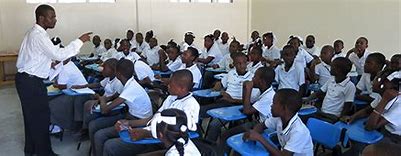
Haiti was once one of the wealthiest colonies in the Americas, but centuries of colonial exploitation, foreign interventions, government mismanagement and natural disasters have contributed to more than half of today’s 11.4 million population living below the poverty line.
The poverty, power imbalances and a lack of education have left Haiti’s youth particularly vulnerable to gang recruitment.
Due to street protests, gang violence and rising Covid-19 cases, schools have repeatedly suspended classes in recent years. Some 70 per cent of the schools in Haiti’s southern peninsula were also damaged or destroyed in the August earthquake.
“The urgency is to train a new generation of citizens,” Education Minister Nesmy Manigat says. “The question today is not which Haiti we will leave to the new generation but which new generation we will leave to Haiti.”
High unemployment and a weak healthcare system loom over many families. Parents have often been forced to leave their children, either for work or because they have no means to care for them. Haiti also has one of the lowest life expectancies in the world.
“I had no one to help me, and so I had to look out for myself,” a 21-year-old former gang member told The New Humanitarian from inside the CERMICOL juvenile detention centre where he has been since he was 18 for gun possession. Asking that he not be named for security reasons, he said his mother died when he was young, and his father was absent. With little to no help available, he found a home with a gang in Jalousie, an area of pastel-coloured shacks hugging a steep hillside in the capital.
Children and teenagers can earn anywhere between a few dollars for running errands to roughly $40 or more a week for other tasks.
One 13-year-old earned more than $50 – no small amount when most Haitians live on less than $2 a day – for alerting gang members to a kidnapping target’s whereabouts, according to another former gang member who was sent to the same correctional facility at 14, serving three years for phone theft. He asked that he also not be named for security reasons.
Another gang member who spoke to The New Humanitarian has been at the correctional facility since he was 16. He’s 19 years old now. He was lured into gangs after the murder of his father, a wharf worker in Jérémie, one of the southern towns worst hit by the August earthquake. He said he had been doing well in school until anger took root. “I said I had to avenge him, because they killed him in front of me,” he told The New Humanitarian.
Although facilities like CERMICOL provide schooling and counselling, they are also breeding grounds for reinforcing gang systems, according to Kettly Julien, executive director for the Institut Mobile d’Education Démocratique (IMED), a human rights organisation that works in correctional facilities.
Some children at the centre wait more than five years before seeing a judge, she said. A single cell sometimes houses between 40 and 60 children. Many youths try to replicate the same gang hierarchy within the correctional facility.
Julien’s group tries to continue helping gang members after they leave the facility, working with NGOs to provide them and their families with food, but sometimes it isn’t enough. “We can’t replace the state and do their jobs for them. That’s not our job,” she said.
Haiti’s political leaders and elites have long used gangs and paramilitary groups to exert control.
One of the best-known paramilitary groups in Haitian history was the “Tonton Macoute”. The group, named after a mythical bogeyman who reportedly ate children, formed in 1959, shortly after a coup attempt against François “Papa Doc” Duvalier.
It was under Duvalier, and later his son, Jean-Claude “Baby Doc” Duvalier, that the area near the capital’s main port and airport – now known as Cité Soleil – began to swell. Two fires in Port-au-Prince and a migration boom saw rural Haitians flock in looking for work.
Many of those jobs, however, were short-lived as unrest drove away investment, and several factories were damaged or destroyed. Other efforts have also floundered, due largely to insecurity and political instability. Many Haitians rely on remittances from the diaspora.
- The New Humanitarian report











